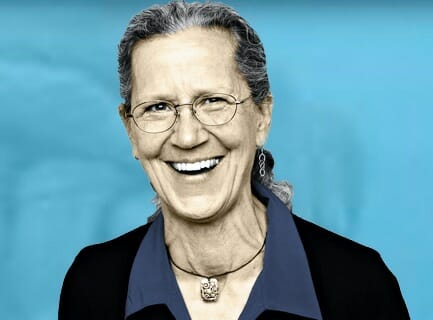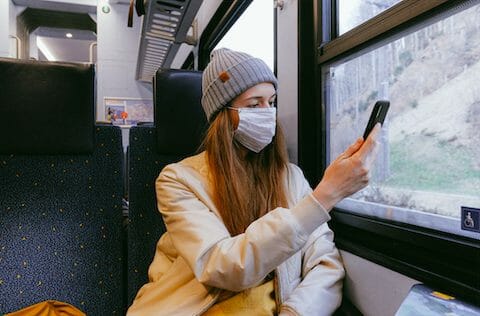Dementia care expert Teepa Snow offers guidance for caregivers at the height of the COVID-19 pandemic.
Being Patient spoke with dementia care expert Teepa Snow on the risks people with dementia face when it comes to COVID-19, what caregivers should do to mitigate that risk and what to do about some of the hard questions caregivers will need to consider.
- Moving loved ones out of care facilities can be overwhelming, particularly if the person with dementia is unprepared for a new routine or resistant to the transition.
- Caregivers will likely struggle to enforce precautionary behaviors like reducing physical contact and touching faces, but there are some things that can help, like wearing gloves, sanitizing everything and finding virtual ways to keep loved ones busy.
- If a loved one with dementia begins showing symptoms, they may face obstacles to get tested, depending on their locations.
Moving Loved Ones Out of Care Facilities
Being Patient: A lot of people right now are concerned about their loved ones living in care facilities. What should they do?
Teepa Snow: We have three groups when it comes to this. There are the people who’ve been in the community for a while, and they’re known to people in the community, and they have relationships. In those situations, we divide them into families that have been involved with going in routinely and daily, and now they’re being told no, you can’t do that. And it’s like, but that’s what helps my person be whole and healthy and happy. So not having that is a big deal.
The second situation is the person who has just moved into the facility recently, and they’re being put in an even more restricted environment than they would otherwise. Additionally, the family can’t see them, and they don’t know how things are going for the person and for the facility. And that’s incredibly scary.
The third is that we have people who have folks in a facility, and there is something going on in the facility—they know there is something going on in the facility—but they’re not allowed in. They’re not necessarily getting a lot of good information, and they don’t know how their person is doing, and it’s incredibly frightening.
And then we have a fourth category that I didn’t even think of when we started the conversation here. We have people who are highly, highly vulnerable and they’re with a partner—there’s a spouse involved. We have one who has dementia, and one who has maybe a slight amount of brain change but is a primary caregiver for that person, and now the two of these folks are not in a family that’s able to support in the way that they have routinely supported.
Being Patient: We’ve heard a lot of talk about people moving their loved ones out of care facilities, and at this point we’re not sure if it’s too late or not. Is there a right answer?
Teepa Snow: Part of it depends on what your setup is. If you were going to take someone home, how long has it been or have you ever been their primary care provider? How aware are you of their abilities, their inabilities? How many supplies do you have in your house already, because getting additional supplies right now can be a real challenge. And finding, if you’re going to do home help care, who’s going to do that? Because many agencies of home care are doing telecare only. Some are still visiting, some will only visit people they’ve been visiting, some will only have the one care person going to one individual.
So you’re taking on a difficult situation to start with, and without preparation and awareness, you can unfortunately make it worse for both of you, for everybody involved, and putting yourself at greater risk for care issues not related to coronavirus because it’s not a routine that either of you are used to.
Being Patient: For those living in care facilities, any change at all can be so overwhelming. Do you take control of the situation, or have a conversation with them?
Teepa Snow: One of the options would be to say, “Mom, I don’t have a choice in this, the government is saying we have to get people to safe places. The only safe place is you guys out of there. Or otherwise they want you to move into a place that would be with a whole bunch of people that you don’t know. It’s the government telling us we have to do something to keep you safe. It’s not my decision. Would you rather be in a country home, or just be in a hotel somewhere? Because they’re saying something has to happen, you can’t stay where you are, interacting where you’re interacting.”
If you can convince them that there’s a higher authority beyond you who’s requiring this, you might just get further than saying that you want to do it for their own good.
Managing COVID-19 Fears and Making Tough Decisions
Being Patient: You’re in touch with a lot of caregivers, what are you picking up as the biggest concerns?
Teepa Snow: How do I help the health professionals who are coming in to make sure that they’re safe while they work with my person? When someone is in a care facility you can’t. So that’s one of those situations where you’ve got to say, “Okay, I need let go of any guilt associated with that because you’re not in charge right now.”
So what can you do? Can you do phone calling, can you do Zoom, is there a way for you guys to connect so that you get a chance to at least look at your person, sing to your person, be with them for a little bit.
Because that’s a huge concern, and yet the honest answer is that we can’t control it. And if you can’t control it, worrying about controlling it is just wearing you out—not putting you in a good place to be when you can be with your person, even if it’s remotely. The second thing I’m hearing is spouses or family members feeling like the person is at high risk, and what if they do get the disease? They fear that they will not be able to close off a person’s life with them and complete it.
I think the lack of what I see right now are reasonable plans for palliative care for people who are highly vulnerable. When they do contract the disease, when and how are those conversations being had? Do we keep working on a cure given that we’re talking about having to put them on a respirator and doing intensive care, especially if we’re at a place in their condition where they didn’t want extraordinary means? And we have people in that situation right now.
Being Patient: How do we keep people with dementia from touching their face or others?
Teepa Snow: It’s not going to happen, so we’ve got to let go of that one. The face is a highly sensitive part of the human body, the hands are highly sensitive parts of the human body, and the more that someone is anxious or nervous from losing contact with other human beings, what else are they supposed to do with their hands?
Touching the face is one of the very first things babies ever do in the world, and we’re saying now that we’ve got to get them to not do that? That’s not going to happen. The idea that we can regulate behavior of someone who is in brain failure, to not do a habitual behavior that is based on a sensory need, is illogical. Accept that the risk is going to be a bit higher. And honestly, I think we need to quit assuming that there is a right and a wrong answer.
It’s a higher risk, but then again, I’m not sure that there’s a no-risk situation. For someone who needs touch to communicate, I think if we rob them of that we might be reducing the risk of this virus, but I’m not sure that we’re improving the risk of staying alive. I think we’d be robbing them of what makes us human beings and having value in living. If I can’t have any of that, why am I still in this world? There are some people for whom that relationship is the most important in the world.
What Do You Do If A Loved One Shows Symptoms?
Being Patient: What should you do if your loved one is showing signs of COVID-19?
Teepa Snow: Yeah, so our challenge is getting tested. They are setting up mobile units, but the problem is your person probably can’t go on their own. We’re not talking about people who can go and get the test on their own, or that if you went with that you could leave them there and say okay, this will go okay because they’ll transfer them over to the emergency room.
One of the questions is how far into the condition are they? Are they compromised in other ways? Finding out, if you see symptoms, what’s going on in your region or your area or your town, your specific situation, before you move forward so that you’re moving forward with intelligence. What’s the situation at hospitals? Where are they treating COVID-19 now? Where are they not? What happens when people come in? Is it better to stay where you’re at, or is it better to seek treatment?
And I don’t have the answers, I just know that for some people who have more advanced dementia, we are going to want to be asking ourselves really hard questions along that line. And they are not easy questions, nor are there easy answers. Because they don’t have the ability to speak for themselves, and putting them in a system where the expectation is to stay in your room, behave and tolerate treatment IVs—which we know are challenging even without the infection control precautions that are in place with COVID-19—can be difficult.



